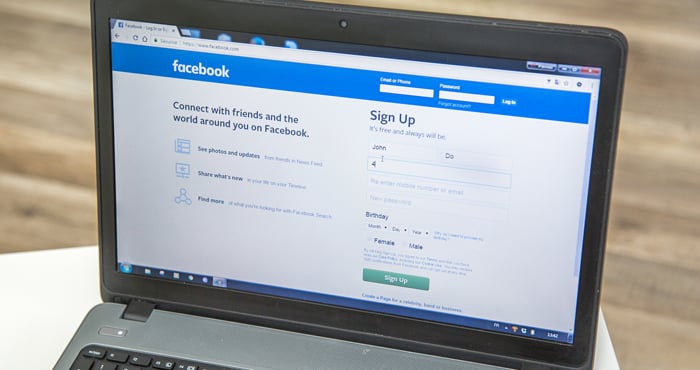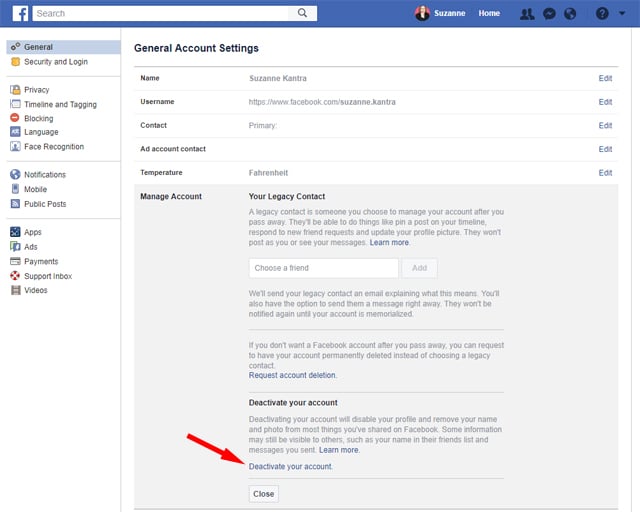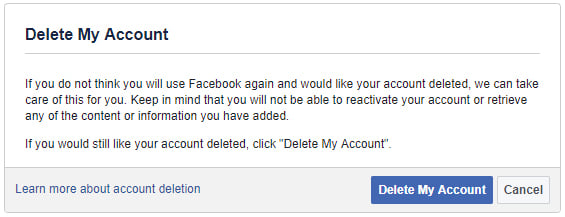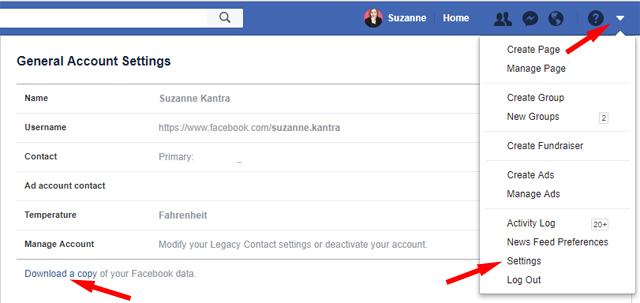
Ever think about deleting your Facebook account? Perhaps you don't want to worry about the privacy threat you and your spouse pose when posting. Or maybe you’d like some time back in your life and simply want to spend less time online.
Whatever your reason for ditching Facebook, you should know that deleting your account is a relatively easy thing to do. There are two ways to quit—one that’s reversible in case you change your mind, and the other permanent, for those who are certain they want out.

Deactivating your account puts it on hold and hides your timeline on the site. Facebook doesn’t delete any of your information just in case you want to come back into the fold. I’ve actually used this option in the past and it’s an easy way to take a break from Facebook and then later switch the lights back on. Once you do, everything comes back—your friends, your likes, previous posts and anything else you did at the site.
You should know, however, deactivating your account does not remove your name from your friends’ lists of friends. If it bothers you that your friends might wonder why they’re not seeing your posts, but can still see you as a friend, it might make sense to let them know you’re leaving the network for a while.
If you want to give deactivation a shot, select the down arrow in the top right, go to Settings > Manage Your Account > Deactivate Your Account. Or, visit https://www.facebook.com/editaccount.php and select Manage Your Account > Deactivate Your Account.

Deletion is the other option and it’s only for people who are absolutely sure they’re never coming back to Facebook and don’t mind the idea of starting from scratch in the event they do change their minds.
When you delete your account, Facebook permanently removes it. Facebook says the deletion process typically takes about one month although “some information may remain in backup copies and logs for up to 90 days.”
To delete your account, visit https://www.facebook.com/help/contact.php?show_form=delete_account.
Keep in mind that messages you’ve sent to other people or posts you’ve shared with groups remain on Facebook even after you delete your account.

Before permanently deleting your account Facebook recommends that you download a copy of all the data Facebook has on you. Select the down arrow, select "Settings" and then select "Download a copy" of your Facebook data.
Even if you’re staying on Facebook it’s a good idea—you might be surprised at how much there is.
Why do you want all your data? For one thing, it’s pretty enlightening to see the vast amount of information you’ve shared on Facebook. Even casual users may find that they've shared an incredible amount of information about myself. To get a sense of what's in your Facebook data file, go to the down arrow and select "Activity Log."
If you do decide to download your personal archive, make sure to store it somewhere safe. It will likely be a huge repository of personal information you likely don’t want to share with others.
Whatever your reason for ditching Facebook, you should know that deleting your account is a relatively easy thing to do. There are two ways to quit—one that’s reversible in case you change your mind, and the other permanent, for those who are certain they want out.
Deactivating Your Facebook Account

Deactivating your account puts it on hold and hides your timeline on the site. Facebook doesn’t delete any of your information just in case you want to come back into the fold. I’ve actually used this option in the past and it’s an easy way to take a break from Facebook and then later switch the lights back on. Once you do, everything comes back—your friends, your likes, previous posts and anything else you did at the site.
You should know, however, deactivating your account does not remove your name from your friends’ lists of friends. If it bothers you that your friends might wonder why they’re not seeing your posts, but can still see you as a friend, it might make sense to let them know you’re leaving the network for a while.
If you want to give deactivation a shot, select the down arrow in the top right, go to Settings > Manage Your Account > Deactivate Your Account. Or, visit https://www.facebook.com/editaccount.php and select Manage Your Account > Deactivate Your Account.
Deleting Your Facebook Account

Deletion is the other option and it’s only for people who are absolutely sure they’re never coming back to Facebook and don’t mind the idea of starting from scratch in the event they do change their minds.
When you delete your account, Facebook permanently removes it. Facebook says the deletion process typically takes about one month although “some information may remain in backup copies and logs for up to 90 days.”
To delete your account, visit https://www.facebook.com/help/contact.php?show_form=delete_account.
Keep in mind that messages you’ve sent to other people or posts you’ve shared with groups remain on Facebook even after you delete your account.
How to Download Your Facebook Data

Before permanently deleting your account Facebook recommends that you download a copy of all the data Facebook has on you. Select the down arrow, select "Settings" and then select "Download a copy" of your Facebook data.
Even if you’re staying on Facebook it’s a good idea—you might be surprised at how much there is.
Why do you want all your data? For one thing, it’s pretty enlightening to see the vast amount of information you’ve shared on Facebook. Even casual users may find that they've shared an incredible amount of information about myself. To get a sense of what's in your Facebook data file, go to the down arrow and select "Activity Log."
If you do decide to download your personal archive, make sure to store it somewhere safe. It will likely be a huge repository of personal information you likely don’t want to share with others.
0 comments:
Post a Comment